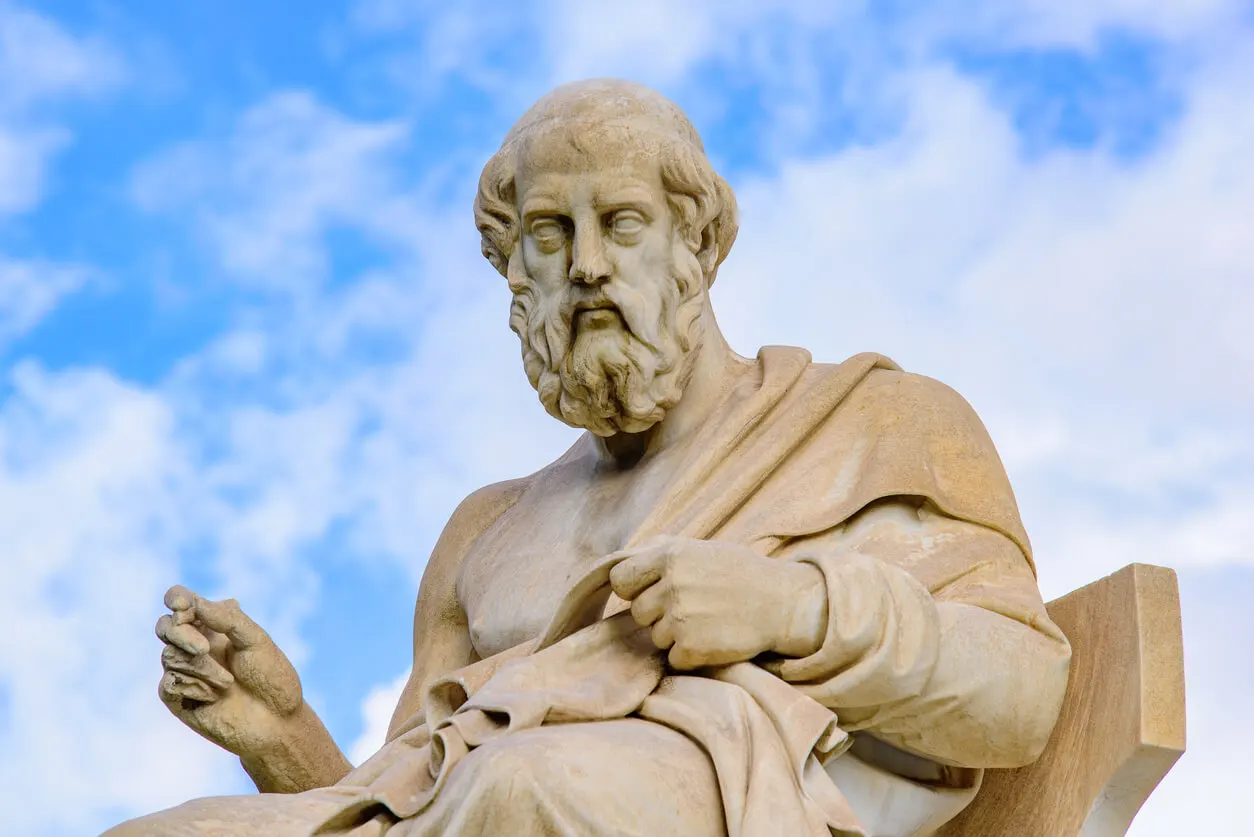Idealism: Types, Characteristics, and Famous Thinkers


Written and verified by the philosopher Maria Alejandra Morgado Cusati
Idealism is one of the main theories of philosophical thought. Its origin dates back to Ancient Greece. Although it has several variants, this current defends that ideas are independent of matter, that consciousness and spirit are autonomous entities of the sensible world, and that it’s impossible to know the world without having a consciousness. In it’s most extreme version, it upholds that nothing exists outside our spirit.
In this sense, idealism defends the notion of soul, the existence of a supreme entity (divinity), and postulates that true knowledge can only be acquired through thought or consciousness.
Among the exponents of idealism are renowned philosophers such as Plato (considered the father of this current), Descartes, Leibniz, Kant, and Hegel. Next, we’ll talk about the characteristics of this interesting philosophy.
A brief history of idealism
Within philosophy, the term idealism began to be used in English and later in other languages around 1743. Although the word was coined at that time, it’s indisputable that idealism has been present in philosophy for more than 2000 years since Plato, who was considered the father of this theory.
In 480 B.C., Anaxagoras taught that all things were created through the mind. However, years later, Plato would assert that the ultimate objective reality was only attainable through the Ideas, which existed independently of the sensible world and could be accessed through the intellect. Centuries later, these beliefs would bear the title of objective idealism.
Along with its Greek roots, many scholars also claim that idealism was present in ancient India. This is especially the case in doctrines such as Buddhism and other Eastern thought schools that used the Vedic texts.
However, idealism would be forgotten for a while and would not come back to prominence until 1700, thanks to philosophers like Kant and Descartes, who would adopt and develop it in depth. It was also at this time that idealism was subdivided into its recognized branches.
Next, we’ll take a look at them.
You’ll definitely like this article: 8 Useful Tips to be an Independent Person
Platonic idealism
As we said, the origin of idealism lies in Plato, who argued that ideas are the real foundation of everything that exists. Besides, they precede the sensible world and exist independently of it.
When explaining the state of being, Plato claims that there are two worlds: a tangible one (physical world) and an intelligible one (one of the ideas).
The first is made up of all that we can experience through the senses. It’s characterized by diversity, being pure appearance, and constantly changing. Therefore, it’s often false and deceptive.
On the other hand, the world of ideas is true, incorruptible, and immutable. There dwell the universal and necessary ideas, essences of all that exists. Thus, the objects and bodies of the physical world are merely imperfect reflections of this world.

Objective idealism
In objective idealism, we find all variants that believe that ideas exist independently of matter and individuals.
This branch also defends the belief that we can only have access to them through experience. Some representatives of this current are Leibniz, Hegel, Bernard Bolzano, and Dilthey.
Subjective idealism
Unlike objective idealism, subjective idealism defends that ideas only have existed in the consciousness or spirit of individuals. Thus, they depend on the mind of the subject. In this sense, the ideas of each person will be forged by their unique personal experience.
This form of idealism has, in turn, two variants. One affirms that nothing outside the mind creates the external world, and the other defends that our senses and knowledge give us distorted information of the external world.
Some representatives of this variant are Descartes, George Berkeley, Kant, Fichte, and Ernst Cassirer.
Transcendental idealism
This type was developed by Immanuel Kant, who defended that in every act of knowledge, there are two elements: the object of knowledge and the subject (the person who seeks to know). In this case, it’s the subject that sets the conditions for knowledge to occur.
In turn, within Kant’s theory, the notions of phenomenon and noumenon are also important. A phenomenon is that which we know of the object through experience and previous cognitive processes. On the other hand, a noumenon is what we do not know of the object, representing the limit of knowledge and is only reached by the intellect.
Absolute idealism
Finally, this is a current attributed to the philosopher Georg Wilhelm Friedrich Hegel. This thinker defended that, for the subject to have access to the knowledge of the world, there must be an absolute identity between thought and being.
For this identity to be given, the subject needs thinking tools that allow them to develop consciousness to reach the true knowledge of the world.
Some representatives of idealism
Overall, many renowned philosophers defended an idealist perspective. Among them are the following.
Plato (427-347 BC)
He was a disciple of Socrates and a teacher of Aristotle. He founded the Academy of Athens, and almost all his work is written in the form of dialogues.
This great thinker affirmed that the sensible world we perceive is only a shadow or reflection of the real world, the topos Uranus (beyond the heavens). This is where the universal ideas live, and where the human soul comes from.
René Descartes (1596-1650)
He’s a French philosopher considered the father of modern philosophy and of rationalism. He’s also one of the forerunners of the scientific revolution.
This thinker divided ideas into three categories: those that arise from the sensible experience of learning or socialization, artificial or imaginative ideas, and natural or innate ideas that come from a superior force or intelligence.
In the same way, intuition was quite relevant in his philosophy yof idealism since this is a direct perception of ideas that does not admit error or doubt.
Gottfried Wilhelm Leibniz (1646- 1716)
He coined the term idealism for the first time, referring to Platonic philosophy. He solved the problem of innate ideas by arguing that they came from the true essence of objects, which he called the monad.
Immanuel Kant (1724-1804)
As the creator of transcendental idealism, he argued that all knowledge comes from combining a subject and an object to be experienced.
In addition, in his work entitled Critique of Pure Reason, he proposed the existence of knowledge prior to experience and the ability to think objects beyond sensible experience.
Georg Wilhelm Friedrich Hegel (1770-1831)
Hegel is also considered one of the most important idealist philosophers. He was the father of absolute idealism, in which notions of dualism are transcended.
Examples of idealism in society
Overall, idealism has permeated various spheres of society. Among the most notorious cases, we find the following:
- Religions: Those that defend the existence of gods and divine beings that have created humans in their image and likeness display this philosophy. In this case, the deities and their words are considered true and immutable ideas.
- Body-soul division: The assertion that the body and soul are separate and that the soul transcends the body is also a popular idealistic manifestation present in beliefs that speak of immortality or reincarnation.
- Human rights: The idea that all humans are equal and have the same rights is long-standing and rests on the belief that man has one essence or idea.
- Astrology: The belief that certain groups of stars and planets govern our destiny also displays certain elements of idealism.

We think you’d like to read: Seven Tips to Discover Your True Passion
The main debates surrounding idealism
Positions against idealism have criticized its tendency to believe in a higher immaterial world. This is also present in religions such as Christianity, which promise an afterlife that’s often seen as more important than the perceptible one. In addition, they criticize that idealism downplays the importance of the observable world and allows the relativization of many arguments and debates.
In fact, within philosophy, we find two great antagonistic currents regarding being and knowledge. Idealism defends that spirit prevails over matter, and materialism affirms that matter exists independently of spirit or idea.
Which one do you feel more identified with?
All cited sources were thoroughly reviewed by our team to ensure their quality, reliability, currency, and validity. The bibliography of this article was considered reliable and of academic or scientific accuracy.
- Diccionario soviético de filosifía. (1959). Idealismo. Revisado en Mar 04, 2023. Disponible en: https://www.filosofia.org/enc/ros/id04.htm
- López, D. M. (2020). Leibniz. Del dogmatismo metafísico al idealismo de la intelectualidad del universo. Tópicos, (39), 177-204. https://www.redalyc.org/journal/288/28864398009/html/
- Stanford Encyclopedia of Philosophy Archive. (2016). Kant’s Transcendental Idealism. Revisado en Mar 04, 2023. Disponible en https://plato.stanford.edu/entries/kant-transcendental-idealism/
- Stanford Encyclopedia of Philosophy Archive. 2022. Plato. Revisado en Mar 04, 2023. Disponible en: https://plato.stanford.edu/entries/plato/
- Stanford Encyclopedia of Philosophy Archive.(2015). Idealism. Revisado en Mar 04, 2023. Disponible en: https://plato.stanford.edu/archives/sum2018/entries/idealism/
This text is provided for informational purposes only and does not replace consultation with a professional. If in doubt, consult your specialist.








